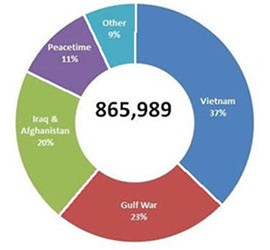Cronkite News has moved to a new home at cronkitenews.azpbs.org. Use this site to search archives from 2011 to May 2015. You can search the new site for current stories.
Arizona vets face some of nation’s longest delays in claims requests
WASHINGTON – A veteran’s benefits claim filed today with the Phoenix office of the Department of Veterans Affairs might not be closed until after Memorial Day.
Of 2014.
In fact, it would be well past Labor Day and almost Columbus Day of next year before the average claim was completed in the Phoenix office, one of the slowest in the nation for closing such claims, according to the most recent numbers from the VA.
It took the Phoenix office an average of 502.2 days to close a claim, according to the department’s latest weekly workload report, which said the national average was 316.6 days. Phoenix was sixth-slowest of the department’s 56 offices, which ranged from 112.5 days in St. Paul, Minn., to 604.1 days in Los Angeles.
As of this week, there were 20,517 claims pending in Arizona, out of 873,680 nationally, according to the latest report. The claims include requests for disability compensation, dependency and supplemental claims.
Roughly three-quarters of the state claims, and about two-thirds at the national level, are considered “backlogged,” or more than 125 days old.
Those delays prompted House and Senate members this week to renew calls for action, meeting with Defense and VA secretaries in the Senate and pushing a package of bills in the House.
“Their disability claims should be resolved in a timely manner, not stuck in a massive backlog,” said Rep. Ann Kirkpatrick, D-Flagstaff, at a Wednesday news conference to unveil the bills. Kirkpatrick has one of those bills, to require that the Defense Department provide records electronically to the VA within 21 days of a request.
Defense Secretary Chuck Hagel and VA Secretary Eric Shinseki also met with senators Wednesday for a roundtable discussion on the benefits backlog.
“We’ve got a lot to do,” Hagel said at a news conference after the meeting, vowing to make the VA backlog a top priority.
A VA spokesman said Friday that the agency is taking a number of steps to speed processing of claims, but that recent years have seen high numbers of claims.
“We feel a strong obligation to make sure our veterans families are taken care of,” said Steve Westerfeld.
Officials said there are a number of reasons that could be driving the delay in processing benefits claims.
“Multiple deployments are the biggest issue,” because they lead to soldiers coming home with more problems, more disabilities and filing more claims, said Mike Klier, assistant deputy director for the Arizona Department of Veterans’ Services.
“You can’t take an 18- or 19-year-old and throw them into a combat situation multiple times,” said Klier, whose state-government office advocates for veterans in Arizona and assists the federal VA in filing claims.
He said the rising number of claims can also be attributed to medical advances and better body armor: Soldiers survive severe injuries that in previous generations would have been fatal.
Klier said his agency is working to stay ahead of the backlog of claims requests. It is completely paperless, for example, which he said expedites the claim process.
Kirkpatrick’s office is trying to help the process along by dedicating a caseworker to help Arizona veterans with their claims. That worker, Brad Hazell, was hired in January.
“From what I’ve seen, it looks like a majority of the cases get caught up in the gathering-evidence process,” said Hazell, who handles around 85 cases.
Kirkpatrick’s bill would help, he said, because claims are often delayed when records from physicians or the military are not readily available.
In the meantime, he said, the wait can be discouraging for Arizona’s veterans. A lot of veterans have told him they believe the VA is just waiting for them to die so it doesn’t have to pay claims, Hazell said.
Klier said it should not take a holiday like Memorial Day to bring attention to the issue.
“It’s a 24/7 issue,” Klier said. “The VA needs to be on top of this 24/7.”









